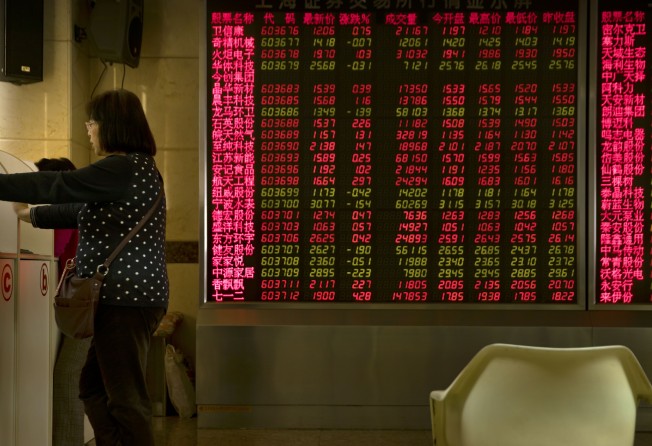China stocks post best weekly gain in nearly four years after MSCI increases A-share weighting in its global benchmarks
- China’s bull market keeps on running on news that means foreign money will flood in
- But US-China trade war cloud keeps day’s early trading gains in check

The Shanghai Composite Index posted its biggest weekly gain in nearly four years, given an end-of-the-week boost by index compiler MSCI’s decision to increase the weighting of China shares in its global benchmarks.
The Shanghai benchmark gained 6.76 per cent during the week in its best performance since June2015 – right before the bubble burst in China’s markets that wiped out US$5 trillion in value.
It closed Friday up 1.8 per cent to 2,994.00. The CSI 300, meanwhile, gained 6.52 per cent in the week to close at 3,749.71. Both indexes moved into bull markets this week.
Global index provider MSCI will quadruple the weighting of Chinese A-shares this year, moving in three steps through the year from May to November, the New-York based firm announced in a statement on Asia’s Friday. China, which only won a spot on the MSCI global indexes last year, will rise to make up 3.3 per cent of its Emerging Markets Index, from the current 0.72 per cent.
Shares in China’s start-up style ChiNext index will also join indexes for the first time this year. The board was up 2.09 per cent to 1,567.87 by end of trading.
In Hong Kong, the Hang Seng Index ended up 0.63 per cent, or 178.99 points, to 28,812.17, while the Hang Seng China Enterprises Index rose 1.23 per cent, or 139.49 points, to 11,506.94.
The MSCI move could send huge amounts of foreign money flowing into China, one of the world’s most volatile major stock markets that is gradually being opened up.
“MSCI inclusion merely marks the start of A-share globalisation, with overseas investors gradually becoming as influential as domestic ones,” said Yannan Chenye, head of China equity research, portfolio manager for investment manager Harvest Global Investments.
“International capital is likely to focus on the stocks with longer-term potential and this focus will drive up valuations of the better-quality companies, leading to improvements in corporate governance and efficiency amongst Chinese firms,” she added.
The changes could lead to US$60 billion of fund inflows this year, compared to under US$10 billion in 2018, Carmen Ling, global head of RMB internationalisation and Belt & Road at Standard Chartered, noted in a report.
Markets broke through earlier concerns over trade and geopolitical risks that hung over US markets overnight.
Positive comments over the future of a US-China trade deal from Larry Kudlow, director of the White House’s National Economic Council, were also felt in Asia.
“The progress has been terrific,” Kudlow said in an interview on CNBC on Thursday. “We have to hear from President Xi [Jinping] and the Politburo of course, but I think we’re headed toward a remarkable deal.”
Overnight in the US, the S&P 500 fell for a third consecutive day, for the first time this year, to end down 0.28 per cent. All three major US indices ended in negative territory.
On Friday China’s manufacturing sector shrank for a third straight month, but at a slower pace, according to private sector data on factory activity.
The Caixin/Markit Manufacturing Purchasing Managers’ Index (PMI) was at 49.9 for February, up from 48.3 in January, due to improvements in domestic manufacturing. A reading below 50 indicates contraction.
Figures were more positive than an official survey on Thursday which showed sentiment in the sector at a three-year low and export orders at their lowest in a decade.
The results seemed to reinforce hopes that Beijing will introduce policies to boost growth at the annual parliamentary meetings starting next week, amid a tumultuous trade war and weakened consumer spending.
In Hong Kong, sectors moved marginally throughout the day.
The consumer sector led the pack, with a 1.63 per cent gain. Dairy products and ice-cream company, China Mengniu Diary, was up 3.09 per cent to HK$25.00, Chinese meat and food-processing company WH Group gained 1.43 per cent to HK$7.07 and China’s largest maker of rice cakes and flavoured milk, Want Want China Holdings, rose 1.42 per cent to HK$6.42.
Information technology followed second, led by China’s biggest maker of smartphone camera modules and lenses, Sunny Optical, which ended up 1.94 per cent to HK$94.80.
Health care remained down throughout the day. CSPC Pharmaceutical Group dropped 1.04 per cent to HK$13.26.
Separately, shares of China-based property firm Greentown China hit a six-week low, falling as much as 10.8 per cent to HK$5.95 in morning trading, after it warned of a 50-60 per cent plunge in profits last year over an increase in provision for losses for mainland properties. It was down 8.70 per cent to HK$6.09 by close.